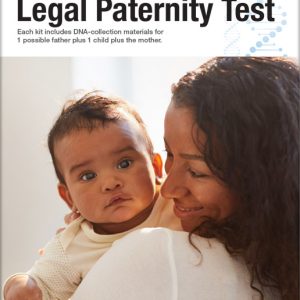Parents, guardians and custodians of children have good reasons to want to know the legal parents of a child. In some cases, multiple parties might want full or partial custody of a child or visitation rights.
Even when custody is not an issue, the courts must often set financial guidelines for the child’s support. In the case of a severe illness, knowing the ethnic heritage of both parents is important in helping diagnose potential diseases and conditions that can be passed genetically among people of a specific ethnicity.
Whatever your reasons for needing a DNA paternity test, you can save time and money by knowing if your test is legally admissible in court. While different states might have different rules and regulations, knowing the basics of court-recognized DNA tests will help you get the right test you need the first time.
Who Can Request a Test?
Depending on the jurisdiction of your case, people who can request a DNA paternity test include the following:
- Alleged mother or father
- Legally recognized mother or father
- An adult child or a minor child’s representative
- Legal guardian or custodian
- Government social services worker
- Prosecuting attorney
While some people can be legally required to take a paternity DNA test, the person requesting the test must be able to show some relationship between the child and alleged parent. The rules and regulations vary by state.
What is the Process?
Getting a legally admissible DNA paternity test is a three- or four-part process, depending on how you have your test performed. If any one of these steps isn’t handled correctly, the court might not accept your DNA sample.
#1 Collect the DNA sample
An independent, third-party professional must collect a DNA sample for a test to be legally valid in most cases. This is usually done with a cheek swab. The professional must be able to verify you are the person you say you are or the child is who you say he or she is, which requires providing a legally valid ID.
Buying a home-DNA test kit, collecting your own sample and sending it to the company through the mail does not result in a court-recognized DNA test. In some jurisdictions, you might be able to use an independent third party to watch you collect the sample and properly transport it to a legally approved facility. If you’re interested in using a home-DNA test, first learn what the process is for making it legally admissible and what forms everyone will need to sign.
#2 Transport the DNA sample to the lab
Once the sample is collected, a court-approved third party must it is properly shipped to the lab doing the testing. This prevents the third-party collection agent from taking the sample and then giving it to a suing party to take to a lab. This could result in the suing party switching the sample. The process of taking a sample and then transporting it to a testing facility is referred to as chain of custody. Courts look at the chain of custody to determine if the sample was in the possession of acceptable third parties during the period from sample collection to transportation to a lab to actual testing.
#3 Have the sample tested
Once your sample is at the lab, it must be tested. Verify with your counsel or judge that the court will recognize the persons or organizations collecting, transporting and testing your sample. Use caution, even if you “know someone” at a lab who can do a DNA test for you. The facility might not be recognized by the court as acceptable for conducting a paternity test. At a minimum, the lab should be accredited by the AABB.
#4 Send the results to the court for a ruling
Once your test is completed, it must be submitted to the court correctly. If the results are sent to you, you must submit the paperwork provided by the lab. The courts might not accept a photocopy or scan of the documents, so discuss with your attorney whether or not you need original documents. Your best might be to have the lab send the results directly to the court, providing you with a second copy.
Things to Avoid
Don’t proceed without guidance from an attorney, the court, or at least a testing facility that can demonstrate to you that they are recognized by the court to collect to transport and test DNA samples.
Don’t destroy your DNA sample until your case is settled. Opposing attorneys might challenge the validity of a test or ask the court to allow them to use the sample for testing at another facility. Ask the laboratory testing the DNA samples how long they keep samples.
Don’t wait to start the testing process if you don’t have to. Even if you ordinarily have standing to seek a DNA test, your state might have a statute of limitations as to when you can require an alleged parent to take a test.
Tampering with a DNA test can result in fines and jail time.






0 Comments